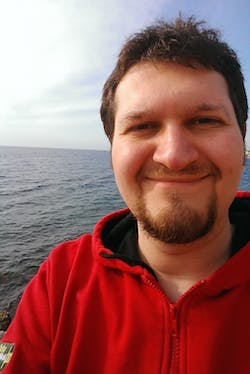Forced to leave their homes for unfamiliar communities, refugees often struggle to secure very basic survival necessities. But with a unique knowledge of the culture and language from which they were uprooted, displaced Syrian citizens have found support—and employment—by teaching others their native language.
Life of a refugee
Moulham Ibrik is an atypical master’s student.
He’s pursuing degrees in prosthetics engineering and intercultural business communications at universities in France and Slovenia. He sleeps between two and six hours each night, and takes French lessons in addition to his college studies. He is separated from family and friends forced to flee their homes because of the five-year-old Syrian civil war.
Ibrik is one of the almost five million Syrian refugees displaced by war. After leaving Syria in February 2015 as violence and extremism ravaged his country, he spent eight months in Turkey, home to almost two million refugees.
Ibrik, 27, now lives in Paris, and tutors Arabic to students around the world in his spare time. As a conversation partner on NaTakallam, an online platform that matches Arabic speakers and learners to Syrian refugees, Moulham is teaching more than conversation skills.
“I think because of the refugee crisis around the world right now, a lot of people might have started to think that the Syrians are different, or they might think that we think in a different way, that we are very conservative, that we might come to Europe and that refugees cause problems,” Moulham said in an interview with the Daily Dot. “I wanted to reach to as many people as possible to see that Syrians are like any other person around the world.”
NaTakallam is not a traditional online learning platform. Conversation partners aren’t certified instructors working off structured syllabi—they’re Syrian refugees making a small income by talking to people who want to learn or practice Arabic. Sometimes they go weeks without a reliable Internet connection or place to live and work.
Designed for students who already know some Arabic or are supplementing traditional Arabic classes with a native speaker through NaTakallam, students practice Levantine, a spoken Arabic dialect. Conversation partners speak French or English in addition to Arabic. Some conversation partners are willing to work with beginners, too.
“I wanted to reach to as many people as possible to see that Syrians are like any other person around the world.”
My teacher, a refugee also living in France, tended to her young child while chatting with me on Skype. The cacophony of cartoons and crying echoed in the virtual classroom, interspersed between lessons on the Arabic words for “want” and “have.” She declined to be interviewed for this story, but our 30-minute session did not just focus on pronouns and conjugation. I asked about her day, her husband, and her children. She asked me about San Francisco and what it’s like to be a writer.
Through Arabic, an opportunity
Of NaTakallam’s current roster of 25 to 30 conversation partners, most are in Lebanon, where over one million Syrian refugees reside. The company partnered with the Beirut-based nonprofit Sawa for Development and Aid to find the first instructors in the region, then expanded to more refugee communities. There are an increasing number of NaTakallam teachers in France and Germany, and individuals in Turkey, Egypt, and Brazil.
For cofounder Aline Sara, NaTakallam is helping to solve a problem she struggled with herself.
Sara is Lebanese, born and raised in the United States. Growing up in a primarily French-speaking home, Arabic took a “back seat,” she said. As a reporter in Lebanon, Sara practiced a conversational Arabic dialect and wanted to continue communicating in Arabic upon her return to New York, but found classes and tutors prohibitively expensive.
Syrians in Lebanon are often not allowed to work and struggle to find opportunities to support themselves and their families. Through connecting Syrians to paying individuals who want to improve their Arabic, NaTakallam provides an educational and cultural exchange of ideas, for a lower cost than personal tutors or university classes.
“We live in the US, we know what’s being said in the media-especially surrounding the presidential campaigns, we know what just happened this morning [regarding the attacks in Brussels]. While NaTakallam serves different purposes for different people, I think that for some, NaTakallam helps to break stereotypes and creates awareness,” Sara said in an interview with the Daily Dot. “When you’re with your conversation partner, some of them will talk about their day-to-day-life, and students will often learn some of the everyday challenges of being in their situation, which they might not have realized before. I am constantly learning working with the team, realizing what is so easy for me but significantly more challenging for some conversation partners given their visa situation or status as refugees.”
Students can choose between $15, $14, or $13 per-hour options based on how many classes they want to take. Displacement due to conflict and difficult working conditions are the only criteria partners must meet, though they must also have a comfortable understanding of English and complete a screening questionnaire.
Ibrik says he often ends up learning more than teaching. He recognizes how facial expressions change based upon which country his students are from, learns his students’ daily activities and traditions, and is beginning to understand how other countries treat foreigners living inside their borders.
We talked about his experience living in Paris as a student without refugee aid, and the negative feelings people have towards refugees and immigrants, especially after the recent terrorist attacks in Paris and Brussels, Belgium.
He only knows two Syrians in Paris, he said—most of his friends are in Germany and Turkey, and there are almost none left in Syria. In Germany, they receive financial assistance, German lessons, as well as take cultural classes for basic necessities, like where someone would buy a screwdriver and where he would buy groceries. On NaTakallam, Ibrik enjoys speaking his native language through the Internet, something he does not frequently do offline.
“I can meet people and talk to people from different cultures. This will enable me to learn how to communicate with any person wherever he comes from,” he said. “When you communicate with people who come from America, or Australia, or London, or any country around the world … whoever I communicate with or talk to, teach, I just always have the feeling that we are all the same. We are all different from the outside, the behaviors that we observe, but from the inside we all have the same thoughts.”
Because many conversation partners have unique living situations, sometimes classes don’t go as planned. The exchange of WhatsApp numbers is encouraged so students can be alerted to things like power outages, relocation, or other emergency circumstances that prevent teachers from logging on Skype.
The company’s guidelines outline some of these challenges, and make sure students understand the issues speaking partners face. For instance, the guidelines tell students that electricity cuts are common in Lebanon, so they should provide alternative contact information in case an instructor has to cancel.
Despite, or perhaps because of, the informal and unusual learning setting, online friendships are blossoming.
“We have some really amazing friendships that are developing, because there’s a difference between being in a classroom with a professor and being one-on-one in a conversational setting,” Sara said.
Making things official
Though the program is geared towards speakers who have some knowledge of Arabic already, NaTakallam is in the process of creating a new program that will provide beginners with more structure in their lessons.
It plans to implement the colloquial and traditional Arabic curriculum from Cornell University’s Arabic programs through a premium feature. Students will eventually have the option to be accredited for their Arabic lessons, which could transfer to college or university programs and cost half or less than half of sitting in a traditional classroom, Sara said.
For younger learners, NaTakallam could be a resource for cultural exchanges in high schools.
“What we’ve thought more of is an exchange at the high school level, where you just have high school students in a refugee camp or in Jordan, and high school students in the U.S. and they meet and have language exchange—one side practices English, and one practices Arabic,” Sara said.
So far, over 400 people have tried the platform or continue to speak with conversation partners. And interest is only increasing as the refugee crisis mounts, and along with it, a heightened awareness of the struggles refugees are facing and a desire to help.
Sara said interest in NaTakallam rose last fall—around the same time, the body of a young Syrian boy, Aylan Kurdi, washed ashore on a beach in Turkey.
NaTakallam can put some of these personal stories in context for students.
“There’s this understanding unfiltered by the media directly from the source,” Sara said. “I think that has a really important value.”
Photo via Christopher Ross/ Flickr (CC by 2.0)



